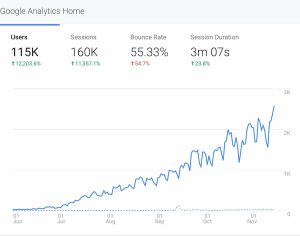Hi, Dave Fox here from Starscape SEO. In today’s digital age, businesses are increasingly turning to content marketing as a strategic tool to reach and engage their target audience.
One of the most popular and effective forms of content marketing is blogging. A blog, a regularly updated online journal, offers a platform for businesses to share their expertise, connect with customers, and drive traffic to their website.
However, like any marketing strategy, blogging has its advantages and disadvantages. Let’s talk about some perks first.

Call or Text Starscape SEO: (519) 208-8680

Improves Website SEO

One of the most significant benefits of blogging is its potential to improve search engine optimization (SEO).
Search engines like Google prioritize websites with fresh, relevant, and valuable content.
By consistently publishing blog posts, businesses can increase their website’s visibility in search engine results pages (SERPs), attracting more organic traffic.
That’s partly why I’m publishing this content, because a) I know about the topic and want to share it, and b) if I don’t share it, people won’t necessarily know that I know it. And this post, in effect, shows my knowledge on the topic.
That can be applied to anyone’s website, provided they have the infrastructure to include a blog, which most platforms do (like WordPress).
Additionally, optimizing blog posts with relevant keywords can further enhance their search engine ranking.
Become a Thought Leader

Moreover, blogging can help businesses establish themselves as thought leaders in their industry.
By sharing informative and insightful content, businesses can position themselves as experts and build trust with their audience.
This can lead to increased brand awareness, customer loyalty, and ultimately, sales.
Additionally, blogging provides an opportunity to showcase the company’s unique selling points and differentiate itself from competitors.
Another advantage of blogging is its ability to drive traffic to a website.
Well-written and engaging blog posts can attract visitors from search engines, social media platforms, and other online channels.
This increased traffic can translate into more leads and conversions.
Furthermore, by including relevant calls to action in blog posts, businesses can encourage visitors to take specific actions, such as signing up for a newsletter or making a purchase.
Blog as Lead Generation Tool

Blogging can also be a valuable tool for lead generation.
By capturing visitor information through forms or email subscriptions, businesses can build a database of potential customers.
This database can then be used for targeted marketing campaigns, nurturing leads, and ultimately, converting them into paying customers.
And even without employing intake forms for people to fill out, you can use various free analytics tools like Google Analytics and Google Search Console to analyze your traffic.
This can be done in order to find out where they come from and specific details about who they are, in order to understand them and their motivations, which are attached to the keywords they type, which you can see in Search Console.
Also, you can use a screen capture tool like Microsoft Clarity, which I use to observe literally time on page behaviour of anyone who visits your site. It is also free to use, and is extremely handy for analyzing visitor behaviour in real time.
Customer Engagement

Additionally, blog comments can provide valuable insights into customer needs and preferences, helping businesses tailor their products and services accordingly.
Furthermore, blogging offers a platform for customer engagement.
By responding to comments, participating in discussions, and answering questions, businesses can foster a sense of community and build relationships with their audience.
Ideally, this content would also get shared on social media, and the discussion could continue there as well.
All of this can lead to increased customer satisfaction, loyalty, and advocacy. Additionally, customer feedback can be used to improve products, services, and overall customer experience.
Blogging Cons

However, blogging is not without its challenges.
One of the main drawbacks is the time and effort required to create high-quality content consistently. Writing informative and engaging blog posts can be time-consuming, especially for businesses with limited resources.
Additionally, maintaining a regular posting schedule can be difficult, particularly during busy periods.
Another disadvantage of blogging is the potential for competition. With millions of blogs online, it can be challenging to stand out and attract a significant audience.
Businesses need to create exceptional content that provides value to their readers and differentiates them from competitors. Additionally, promoting blog posts through social media and other channels is essential to reach a wider audience.
Furthermore, blogging can be affected by changes in search engine algorithms.
Search engines are constantly updating their algorithms to improve search results. This can impact the visibility of blog posts, even if they were previously ranking well.
To mitigate this risk, businesses need to stay informed about search engine trends and adjust their blogging strategies accordingly.
Conclusion
In conclusion, blogging offers numerous benefits for businesses, including improved SEO, brand authority, increased traffic, lead generation, and customer engagement.
However, it also requires time, effort, and a strategic approach.
By understanding the pros and cons of blogging and implementing effective strategies, businesses can leverage this powerful tool to achieve their marketing goals.

